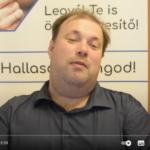
László Bercse talks about self-advocacy, how the European Platform of Self-Advocates works, and about campaigning. Lázslo made his speech for the conference in Spain establishing a new national platform of people with intellectual disabilities.
Dear Self-advocate colleagues!
I am László Bercse, chairperson of EPSA. EPSA is the European Platform of Self-Advocates.
I am also the vice-president of Inclusion Europe.
EPSA is part of Inclusion Europe.
European Platform of Self-Advocates
EPSA has 20 member organisations from 17 countries.
The Platform makes self-advocates more visible and stronger.
It makes it possible to advocate together for our common goals.
EPSA brings together self-advocates from all over Europe.
The Steering Group of EPSA are self-advocates as well.
There are 5 of us in the Steering Group.
Since last year we have Ana Martinez from Spain in the Steering Group.
EPSA has a coordinator who supports us.
Every Steering Group member has an own support person as well.
They support us and translate for us during meetings.
The do not speak for us. They help us to tell what we want and to express our opinion.
EPSA makes sure that the voices of self-advocates are heard by politicians and decision-makers in Europe.
We ask our members about what topics are important to them.
And we share information with them about laws, policies and rights.
Representation
We also make sure that our concerns and demands are being considered by Inclusion Europe when they are making plans or talking to decision-makers.
Self-advocates are represented at Inclusion Europe’s board.
The EPSA chairperson is one of Inclusion Europe vice-presidents.
So, we have a say in running the organisation.
We take part at Board meetings and different committees.
Our colleagues at Inclusion Europe do a lot in order to fully include us in the advocacy work.
We get easy-to-read papers and we can always ask or comment on the topics.
We work a lot as well to prepare for meetings.
We often speak at conferences. We represent self-advocates at many countries.
We also speak at events organized by the European Union.
We want to be heard in questions that concern us.
Conferences and training
Every two years we organise a conference for self-advocates.
We are also involved in trainings to empower European self-advocates.
In the last one and half years we have been working online due to the coronavirus-pandemic.
This has not been easy for us as an international organisation.
Especially when our supporters could not be in the same room with us.
But we kept working.
We had to speak up for each other, as it has been a very challenging time for self-advocates.
We have been facing more challenges than usual.
Last spring, we asked our members about what is happening in their countries.
So, we know what things people are worried about.
They are worried about staying in touch with their families and friends; about keeping their jobs; getting the support, they need to overcome this pandemic; they are worried about getting sick.
Our worries are the same as for any other person.
We need others to understand this! And to treat us like they would like to be treated.
We need the same opportunities!
We need policies, laws and regulations that treat us as any other citizen.
Because we are citizens too!





